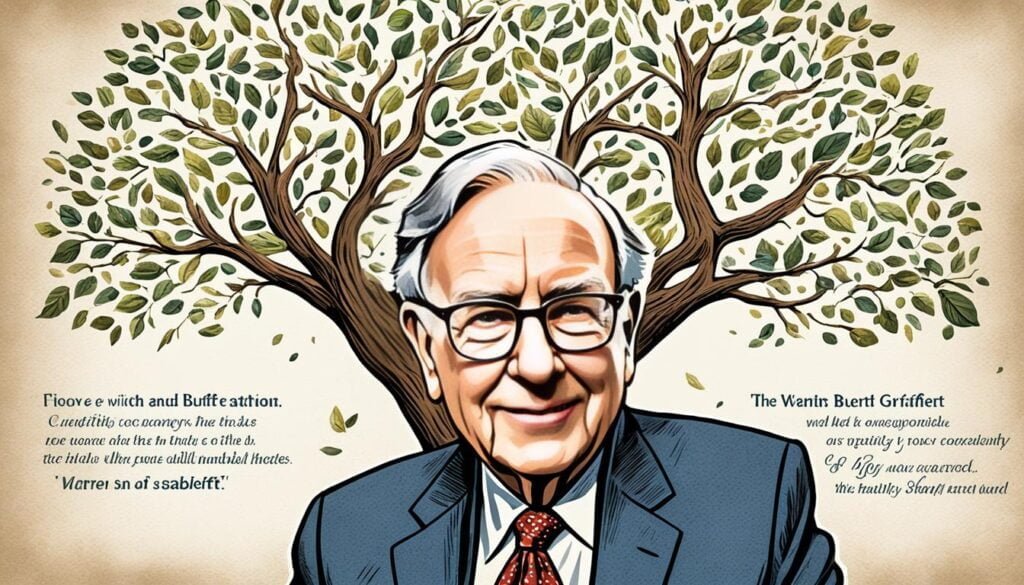Warren Buffett On Leadership: The Importance Of Humility And Error Prevention

Table of Contents
Warren Buffett's Humble Approach to Leadership
Warren Buffett's leadership isn't characterized by arrogance or self-promotion; instead, it's built on a bedrock of humility and a constant willingness to learn. This approach fosters a culture of trust and collaboration, critical elements for effective leadership.
The Power of Self-Awareness
Buffett's self-awareness is legendary. He readily acknowledges his limitations, understanding that he doesn't know everything. This humility allows him to actively seek diverse perspectives and learn from others. He doesn't shy away from admitting mistakes; in fact, he sees them as invaluable learning opportunities.
- Examples: Buffett's public acknowledgment of his investment errors in companies like Dexter Shoe demonstrates his self-awareness and willingness to learn from setbacks. His consistent seeking of advice from trusted advisors and his open-mindedness towards different viewpoints showcase his commitment to continuous improvement. His willingness to delegate significant responsibilities also highlights his understanding of his own limitations and the strengths of his team.
Delegation and Trust
Buffett's leadership style is defined by his ability to delegate effectively and trust his team implicitly. He surrounds himself with exceptionally talented individuals and empowers them to make decisions, fostering a culture of ownership and accountability. This trust creates an environment where innovation and creativity can thrive.
- Examples: The decentralized management structure at Berkshire Hathaway, with its various autonomous subsidiaries, is a testament to Buffett's trust in his managers. He provides them with significant autonomy, allowing them to operate with independence while maintaining alignment with Berkshire Hathaway's overall values and objectives. This approach maximizes efficiency and allows for expertise to flourish in specialized areas.
Leading by Example
Buffett's unwavering commitment to integrity and ethical conduct is a cornerstone of his leadership. He leads by example, demonstrating consistent adherence to high ethical standards, inspiring similar behavior in his employees and partners. This fosters a culture of trust and responsibility, strengthening relationships with stakeholders and creating long-term value.
- Examples: Buffett's consistent philanthropy and his emphasis on long-term value creation over short-term gains demonstrate his ethical leadership. His unwavering commitment to transparency and honest communication further solidifies his reputation for integrity, which directly influences the ethical behavior within Berkshire Hathaway.
Buffett's Strategies for Error Prevention
Beyond humility, Buffett's success hinges on his proactive strategies for error prevention. These aren't merely reactive measures; they're deeply ingrained in his decision-making process, minimizing risks and maximizing long-term success.
Thorough Due Diligence
Buffett's meticulous approach to investment analysis is legendary. He emphasizes exhaustive research and risk assessment, ensuring a comprehensive understanding of the underlying businesses before making any investment decisions. This thorough due diligence minimizes the likelihood of significant errors.
- Examples: Buffett’s famous "moat" concept, focusing on companies with sustainable competitive advantages, highlights his rigorous analysis of businesses. His long-term investment horizon allows him to thoroughly research companies and wait for favorable entry points, further reducing the risk of making hasty, poorly informed decisions.
The Circle of Competence
Buffett's "circle of competence" is a crucial element of his approach to both investing and leadership. He emphasizes focusing on areas where he possesses expertise and avoiding ventures outside that circle. This strategic restraint prevents him from making decisions based on insufficient knowledge or understanding.
- Examples: Buffett's consistent focus on businesses he understands well, primarily within his areas of expertise, exemplifies this principle. By staying within his circle of competence, he avoids overextending himself and making decisions that could lead to significant losses. This disciplined approach is directly transferable to leadership roles, advocating for focusing on core competencies and delegating tasks outside one's area of expertise to qualified individuals.
Long-Term Perspective
A long-term outlook is crucial to Buffett's success. He consistently emphasizes patience and avoids short-sighted decisions. This long-term perspective provides the necessary time for investments to mature and for leadership strategies to yield results.
- Examples: Buffett's decades-long investment in Coca-Cola and American Express are perfect illustrations of his long-term strategy. His ability to resist short-term market pressures and maintain a focus on long-term value creation has been pivotal to his success. This patience and long-term focus are essential elements in effective leadership, as they foster a culture of sustainable growth rather than short-term gains.
Conclusion
Warren Buffett's leadership success is a testament to the power of humility and error prevention. His self-awareness, commitment to thorough due diligence, emphasis on his circle of competence, and long-term perspective are invaluable lessons for leaders in any field. By embracing these principles – fostering self-reflection, seeking diverse perspectives, and prioritizing long-term value creation – we can all improve our leadership skills and build more successful and resilient organizations. Embrace Warren Buffett's leadership principles to build a more successful and resilient team. Implement his strategies for error prevention and cultivate humility to guide your leadership journey! Learn more about Warren Buffett's investing principles and leadership style to further enhance your leadership capabilities.

Featured Posts
-
 James Gunn Reveals Crucial Hawkgirl Wing Detail In Superman Movie
May 07, 2025
James Gunn Reveals Crucial Hawkgirl Wing Detail In Superman Movie
May 07, 2025 -
 The Last Of Us Season 2 Episode 4 Production Challenges And A Week Long Shoot
May 07, 2025
The Last Of Us Season 2 Episode 4 Production Challenges And A Week Long Shoot
May 07, 2025 -
 Data Vykhoda 7 Sezona Chernogo Zerkala Podtverzhdeno Na 13 Marta 2025 Goda
May 07, 2025
Data Vykhoda 7 Sezona Chernogo Zerkala Podtverzhdeno Na 13 Marta 2025 Goda
May 07, 2025 -
 Forget The High Table A Potential Plot For John Wick 5
May 07, 2025
Forget The High Table A Potential Plot For John Wick 5
May 07, 2025 -
 Las Vegas Aces Free Agency Analyzing The Parker Tyus And Evans Decisions
May 07, 2025
Las Vegas Aces Free Agency Analyzing The Parker Tyus And Evans Decisions
May 07, 2025
